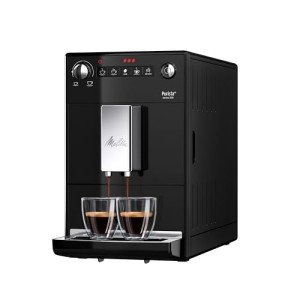Home Use Espresso Machines: What's New? No One Is Talking About
Home Use Espresso Machines: A Comprehensive Guide
Espresso machines have actually become a staple in many families as coffee enthusiasts seek to duplicate café-quality brews in the comfort of their kitchens. The rise in popularity has resulted in a diverse market filled with various designs, features, and rates. This short article aims to provide an informative summary of home use espresso machines, assisting readers browse their options effectively.
Understanding Espresso Machines
Espresso machines work by requiring warm water through finely-ground coffee under high pressure, resulting in a concentrated coffee beverage called espresso. There are numerous types of espresso machines classified based upon their brewing approaches and level of automation. The most common types include:
Manual Espresso Machines: These need the user to control the pressure and water circulation, permitting a more hands-on coffee-making experience.
Semi-Automatic Espresso Machines: These provide automatic control over water pressure, while the user by hand grinds and tamps the coffee.
Automatic Espresso Machines: With the push of a button, these machines immediately manage the flow of water, making it easier to brew espresso with consistent outcomes.
Super-Automatic Espresso Machines: These all-in-one machines handle grinding, tampering, brewing, and even milk frothing, making them ideal for users trying to find convenience.
Capsule or Pod Machines: These use pre-packaged coffee pods to produce espresso with minimal effort, however they limit option in developing strategies and flavors.
Table: Comparison of Espresso Machine Types
Type
Control Level
Relieve of Use
Cleaning Level
Suitable For
Manual
User-controlled
Moderate
High
Coffee perfectionists
Semi-Automatic
Partial automation
Moderate
Moderate
Home baristas
Automatic
Totally automated
Easy
Low
Busy individuals
Super-Automatic
Fully automated
Really easy
Extremely low
Convenience seekers
Capsule/Pod
Fully automated
Extremely easy
Extremely low
Casual drinkers
Key Features to Consider
When choosing a home use espresso machine, it's necessary to think about numerous features that can substantially affect the quality of espresso and user experience.
Pressure: Look for machines that provide at least 9 bars of pressure, as this is thought about optimum for developing espresso.
Boiler Systems: Single vs. dual boiler systems identify temperature level stability and the ability to brew espresso and steam milk simultaneously.
Grinder: Integrated mills enable freshly ground coffee, which enhances flavor. Think about machines with adjustable grind settings.
Milk Frother: For those who delight in coffees and lattes, an integrated steam wand or automatic frother is essential.
Size and Design: Consider your cooking area area and visual choices. Machines are available in different sizes, from compact to big setups.
Price: Home espresso machines can range from a couple of hundred to several thousand dollars, so it's important to develop a budget before exploring alternatives.
Benefits and drawbacks of Home Use Espresso Machines
Pros
Cons
Benefit of brewing coffee in the house
Initial financial investment can be high
Quality of espresso is frequently superior
Requires some ability, specifically with manual machines
Capability to try out tastes
Upkeep and cleansing can be labor-intensive
Can conserve money in the long run
Not all machines will suit every coffee choice
Upkeep and Cleaning Tips
Keeping an espresso machine is crucial for extending its life and guaranteeing constant brew quality. Here are some beneficial tips:
Regular Descaling: Minerals from water can develop in the machine. Descale every 1-3 months, depending upon water solidity.
Daily Cleaning: Rinse portafilters, baskets, and steam wands after each use to prevent coffee oils from developing residue.
Use Filtered Water: This can assist minimize mineral accumulation and improve the taste of coffee.
Replace Gaskets and Seals: These elements may break gradually and must be changed to maintain pressure and performance.
Check out the Manual: Each machine has specific care guidelines; following these will ensure longevity.
FAQs About Home Use Espresso Machines
**Q1: What is the very best budget espresso machine?The best budget espresso machine typically depends upon individual requirements, but models like the DeLonghi EC155 or the Breville Bambino are popular among users for offering great worth. Q2: How long do home espresso machines normally last?With proper upkeep, home espresso machines can last anywhere from 5 to 15 years, depending on the quality of the machine and frequency of use. Q3: Can I make cappuccinos and lattes with any espresso machine?While most espresso machines can make coffees and lattes, having a reputable
steam wand or frother is essential for achieving the best milk texture.
Q4: Are super-automatic machines worth the investment?For those who prioritize benefit and quick brewing, super-automatic machines can be worth the investment, though they may lack some customizability in brew strength and flavor. Q5: What kinds of coffee beans are best for espresso?While Pump Espresso Machines contributes, beans labeled as” espresso “blends are typically roasted darker, developing abundant tastes and a creamy texture when brewed.
Buying a home espresso machine can change the daily coffee routine into something unique, raising home brews to café quality. By understanding the various kinds of machines, crucial functions to think about, maintenance needs, and weighing the
pros and cons, consumers can make informed choices that match their private choices. As the espresso culture continues to grow, no matter the option, every brew can be a tasty experience waiting to be appreciated.  **
**